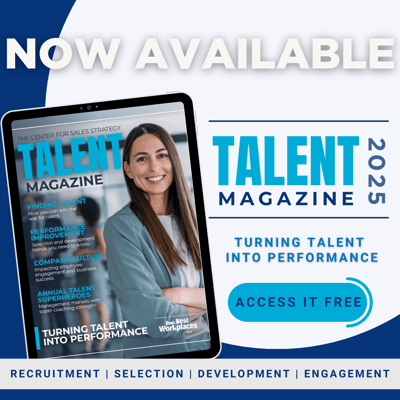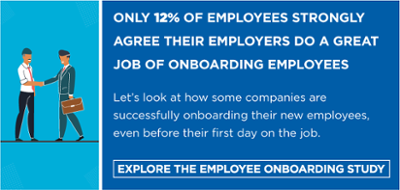
Sapling has found that “Without powerful onboarding, it takes around 8 to 12 months for new employees to reach their full productivity levels.”
By taking the time upfront to onboard people in a meaningful way, they’ll be able to begin contributing at higher levels quicker and make a more immediate impact on the organization.
Onboarding is a prime opportunity for employers to win the hearts of new employees. Don't waste it, experts say.
New Hires Leave Companies Within the First Six Months
 Onboarding is the magical moment when new employees decide to stay engaged or become disengaged. It’s one opportunity that employers have to leave a lasting impression on employees for the duration of their career.
Onboarding is the magical moment when new employees decide to stay engaged or become disengaged. It’s one opportunity that employers have to leave a lasting impression on employees for the duration of their career.
Is it really that important to formulate a detailed plan for onboarding?
Absolutely.
Imagine going through the hiring process, finally finding that top performer, and giving them a chaotic, disorganized first-day experience - something experts call death by orientation.
New hires who experience a badly planned and executed onboarding experience may conclude that the organization is poorly managed and decide that it was a mistake to take the job. According to a BambooHR report, new hires leave companies within their first six months at an alarming rate.
Here's the breakdown of when people leave:
- 1st Week: 16.45%
- 1st Month: 17.42%
- 2nd Month: 16.77%
- 3rd Month: 17.42%
- 4th Month: 10.97%
- 5th Month: 5.48%
- 6th Month: 14.48%
Why are people leaving so quickly? The report indicates that new employees feel that they are neglected, overwhelmed, under-appreciated, and underqualified.
What New Hires Really Want During Onboarding
The best way to retain top talent is to provide a successful onboarding process. Here are the top three things new hires say they want:
- A Clear Plan
- A Mentor
- Cheat Sheets
Creating a successful onboarding plan involves several steps. Prepare ahead of time by setting up the new employee’s workspace, making sure their computer and supplies are ready. Most importantly, prepare your plan for how onboarding will go. What type of training will they receive, when, from whom, and how much time is allotted? Have a copy of this plan ready on their first day or email it to them beforehand.
Thinking about how the first day will go helps to create a warm and welcoming plan. Involve their designated mentor and offer coffee or breakfast before receiving a tour.
They need to be shown their onboarding plan and be introduced to their workspace and the technology they will use. They’ll also need to be taken to human resources to fill out any remaining paperwork. And they need to be introduced to their manager and team.
In the first week, they should be introduced to those who will be a resource. There should be daily check-ins with their manager and mentor to make sure they have everything they need. They’ll also need feedback on their progress with onboarding.
What a Strong Onboarding Program Includes
A strong Onboarding program includes:
- First day orientation: a warm welcome, tour of the work area and meeting with their manager and team.
- Onboarding in the first weeks and months: learn about each other, share onboarding plan and expectations, learn about the company and the customer
Employee engagement starts when you offer the job. 69% of employees are more likely to stay with a company for three years if they experienced great onboarding. Gallup also finds that when managers take an active role in onboarding, "employees are 3.4 times as likely to strongly agree their onboarding experience was exceptional."


